The Mortar Testing Equipment Market is estimated to be valued at USD 2.5 billion in 2025 and is projected to reach USD 4.5 billion by 2035, registering a compound annual growth rate (CAGR) of 6.0% over the forecast period.
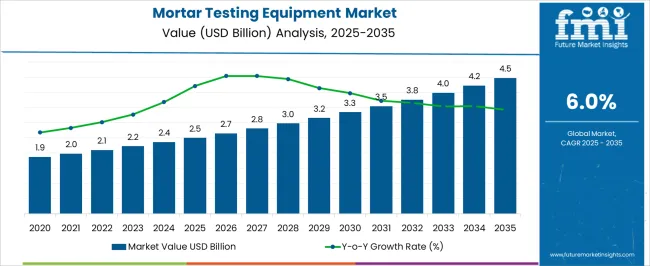
| Metric | Value |
|---|---|
| Mortar Testing Equipment Market Estimated Value in (2025 E) | USD 2.5 billion |
| Mortar Testing Equipment Market Forecast Value in (2035 F) | USD 4.5 billion |
| Forecast CAGR (2025 to 2035) | 6.0% |
The Mortar Testing Equipment market is being driven by the growing focus on construction quality assurance, safety compliance, and structural integrity monitoring. In 2025, the market is witnessing increased demand across infrastructure, commercial buildings, and residential construction projects. Equipment that ensures proper mortar composition and strength is being prioritized to meet regulatory requirements and reduce construction defects.
The future outlook is being supported by rising investments in infrastructure development and the adoption of modern testing methodologies that offer real-time data analysis. Innovations in portable and automated equipment are improving field testing efficiency while reducing operational downtime. Additionally, the growing preference for on-site testing is influencing faster decision-making during construction workflows.
The market is expected to benefit from advancements in sensor technologies, data analytics, and mobile testing solutions, which are enabling more accurate measurements of air content, density, and compressive strength As construction projects become more complex and regulatory bodies enforce stricter standards, the demand for reliable and scalable mortar testing solutions is anticipated to grow steadily.
The mortar testing equipment market is segmented by equipment type, location, machine type, and geographic regions. By equipment type, mortar testing equipment market is divided into Air Content And Density, Fineness, Mixing And Molding, Density And Fly Ash, and Others. In terms of location, mortar testing equipment market is classified into On-Site, R&D Laboratory, and Educational Institutes. Based on machine type, mortar testing equipment market is segmented into Portable and Stationery. Regionally, the mortar testing equipment industry is classified into North America, Latin America, Western Europe, Eastern Europe, Balkan & Baltic Countries, Russia & Belarus, Central Asia, East Asia, South Asia & Pacific, and the Middle East & Africa.
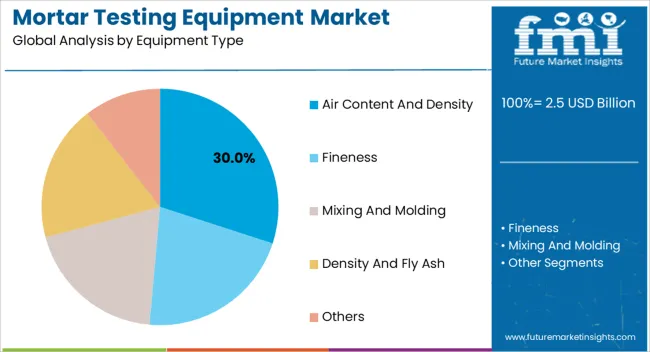
The Air Content And Density equipment type is projected to hold 30.00% of the overall Mortar Testing Equipment market revenue share in 2025, making it a leading category. This segment has been favored due to its ability to ensure that mortar mixtures meet strict performance standards in strength and durability.
The growing complexity of construction projects and the rising use of high-performance materials have increased the need for precise measurement of air voids and material density during mixing and curing processes. The importance of maintaining proper air content for frost resistance, durability, and structural integrity has made this equipment highly sought after by contractors and quality control teams.
Furthermore, the adoption of this equipment has been supported by increasing regulatory requirements in both urban and rural construction environments As the demand for safer, longer-lasting structures continues to rise, the need for equipment capable of delivering accurate, real-time data on mortar composition is expected to propel the growth of this segment further.
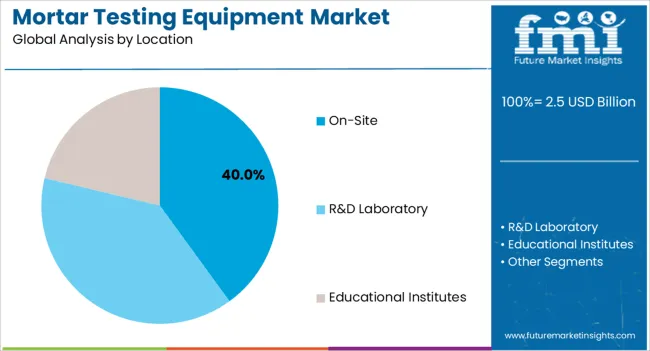
The On Site location segment is expected to account for 40.00% of the total revenue share in the Mortar Testing Equipment market in 2025, positioning it as one of the largest application categories. This prominence has been attributed to the growing need for real-time testing at construction sites, which allows for immediate verification of material quality without the delays associated with lab-based testing.
The ability to conduct tests on-site has provided contractors with enhanced control over material properties and process workflows. Additionally, the rising complexity of construction projects has demanded faster and more efficient testing methods that reduce downtime and ensure timely compliance with quality benchmarks.
The segment’s growth has also been supported by the increasing use of portable equipment that is lightweight, easy to deploy, and capable of delivering accurate results under field conditions As construction projects become more time-sensitive and regulation-driven, on-site testing is expected to remain critical in ensuring that safety and performance standards are met without compromising project schedules.
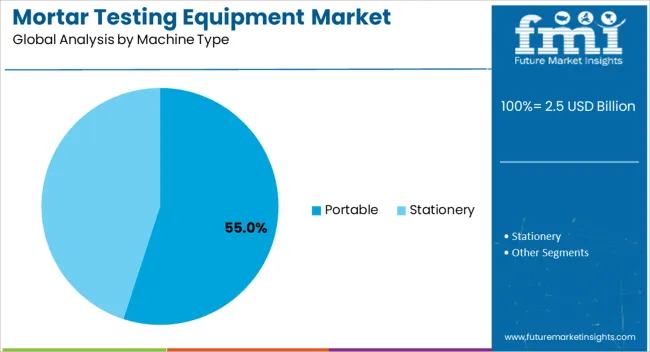
The Portable machine type segment is anticipated to hold 55.00% of the overall Mortar Testing Equipment market revenue share in 2025, making it the dominant category within machine types. This growth has been influenced by the widespread adoption of equipment that can be easily transported, deployed, and operated at various construction sites. Portable devices have become indispensable in scenarios where mobility and quick setup are required to perform routine tests without reliance on fixed laboratories.
The rising need for rapid decision-making and field-level quality checks has encouraged the adoption of such equipment across residential, commercial, and infrastructure projects. Furthermore, the segment has benefitted from improvements in battery life, sensor precision, and data connectivity, which have made portable machines more user-friendly and reliable in diverse environments.
The growing trend of remote monitoring and data-driven construction management has also supported the expansion of this segment With field-level testing being increasingly prioritized for safety and compliance, portable mortar testing solutions are expected to continue leading the market’s growth in the years to come.
The rapid urbanization and continuous developments in infrastructure are fuelling the growth of the global mortar testing equipment market. During the construction process, it is essential to test mortar to ensure compliance and meet the standard requirements in various regions.
Some of these mandatory tests are crushing test, tensile strength test, adhesive test, etc. It is also crucial to check soundness, setting time, consistency, flow, and expansion of mortar. The most common types of mortar testing equipments in the market are air content and density, fineness, mixing and molding, density and fly ash, and others.
To ensure the security and safety, the associations and government of various countries are taking the initiative to standardize the properties of mortar used for construction. The government has mandated the tests which must be performed during the construction.
The increasing regulations for material testing to enhance safety and security, the mortar testing equipment market is expected to grow at a significant rate during the forecast period. Standards required for mortar testing are- AASHTO T 303, ASTM C 1012, ASTM C 109, ASTM C 1152, ASTM C 1218, ASTM C 1506, ASTM C 157, ASTM C 387, ASTM C 441, ASTM C 531, CSA A3004-C4, CSA A3004-C7, ANSI/NSF61, and others.
These standards play a crucial role in the growth of mortar testing equipment market.
Advanced technology enabled mortar testing equipment is witnessing a huge demand in the market. To fulfill the demand, vendors are offering fully automated cement and mortar testing equipments. The demand for advanced technology mortar testing equipment is expected to increase during the forecast period.
Vendors such as Controls Group are offering fully automatic cement and mortar tester with PC control option, accurate load rate control for quality testing, two frame control and, others.
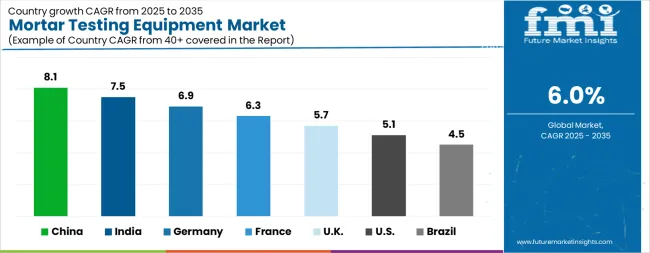
| Country | CAGR |
|---|---|
| China | 8.1% |
| India | 7.5% |
| Germany | 6.9% |
| France | 6.3% |
| UK | 5.7% |
| USA | 5.1% |
| Brazil | 4.5% |
The Mortar Testing Equipment Market is expected to register a CAGR of 6.0% during the forecast period, exhibiting varied country level momentum. China leads with the highest CAGR of 8.1%, followed by India at 7.5%. Developed markets such as Germany, France, and the UK continue to expand steadily, while the USA is likely to grow at consistent rates. Brazil posts the lowest CAGR at 4.5%, yet still underscores a broadly positive trajectory for the global Mortar Testing Equipment Market. In 2024, Germany held a dominant revenue in the Western Europe market and is expected to grow with a CAGR of 6.9%. The USA Mortar Testing Equipment Market is estimated to be valued at USD 887.5 million in 2025 and is anticipated to reach a valuation of USD 1.5 billion by 2035. Sales are projected to rise at a CAGR of 5.1% over the forecast period between 2025 and 2035. While Japan and South Korea markets are estimated to be valued at USD 122.4 million and USD 83.1 million respectively in 2025.
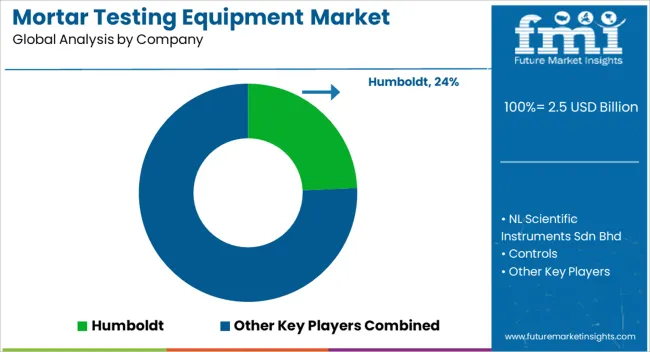
| Item | Value |
|---|---|
| Quantitative Units | USD 2.5 Billion |
| Equipment Type | Air Content And Density, Fineness, Mixing And Molding, Density And Fly Ash, and Others |
| Location | On-Site, R&D Laboratory, and Educational Institutes |
| Machine Type | Portable and Stationery |
| Regions Covered | North America, Europe, Asia-Pacific, Latin America, Middle East & Africa |
| Country Covered | United States, Canada, Germany, France, United Kingdom, China, Japan, India, Brazil, South Africa |
| Key Companies Profiled | Humboldt, NL Scientific Instruments Sdn Bhd, Controls, ELE International, Accro-Tech Scientific Industries, Cement Test Equipment, Aimil, Qualitest International, and Matest |
The global mortar testing equipment market is estimated to be valued at USD 2.5 billion in 2025.
The market size for the mortar testing equipment market is projected to reach USD 4.5 billion by 2035.
The mortar testing equipment market is expected to grow at a 6.0% CAGR between 2025 and 2035.
The key product types in mortar testing equipment market are air content and density, fineness, mixing and molding, density and fly ash and others.
In terms of location, on-site segment to command 40.0% share in the mortar testing equipment market in 2025.






Our Research Products

The "Full Research Suite" delivers actionable market intel, deep dives on markets or technologies, so clients act faster, cut risk, and unlock growth.

The Leaderboard benchmarks and ranks top vendors, classifying them as Established Leaders, Leading Challengers, or Disruptors & Challengers.

Locates where complements amplify value and substitutes erode it, forecasting net impact by horizon

We deliver granular, decision-grade intel: market sizing, 5-year forecasts, pricing, adoption, usage, revenue, and operational KPIs—plus competitor tracking, regulation, and value chains—across 60 countries broadly.

Spot the shifts before they hit your P&L. We track inflection points, adoption curves, pricing moves, and ecosystem plays to show where demand is heading, why it is changing, and what to do next across high-growth markets and disruptive tech

Real-time reads of user behavior. We track shifting priorities, perceptions of today’s and next-gen services, and provider experience, then pace how fast tech moves from trial to adoption, blending buyer, consumer, and channel inputs with social signals (#WhySwitch, #UX).

Partner with our analyst team to build a custom report designed around your business priorities. From analysing market trends to assessing competitors or crafting bespoke datasets, we tailor insights to your needs.
Supplier Intelligence
Discovery & Profiling
Capacity & Footprint
Performance & Risk
Compliance & Governance
Commercial Readiness
Who Supplies Whom
Scorecards & Shortlists
Playbooks & Docs
Category Intelligence
Definition & Scope
Demand & Use Cases
Cost Drivers
Market Structure
Supply Chain Map
Trade & Policy
Operating Norms
Deliverables
Buyer Intelligence
Account Basics
Spend & Scope
Procurement Model
Vendor Requirements
Terms & Policies
Entry Strategy
Pain Points & Triggers
Outputs
Pricing Analysis
Benchmarks
Trends
Should-Cost
Indexation
Landed Cost
Commercial Terms
Deliverables
Brand Analysis
Positioning & Value Prop
Share & Presence
Customer Evidence
Go-to-Market
Digital & Reputation
Compliance & Trust
KPIs & Gaps
Outputs
Full Research Suite comprises of:
Market outlook & trends analysis
Interviews & case studies
Strategic recommendations
Vendor profiles & capabilities analysis
5-year forecasts
8 regions and 60+ country-level data splits
Market segment data splits
12 months of continuous data updates
DELIVERED AS:
PDF EXCEL ONLINE
Cement and Mortar Testing Equipment Market Growth – Trends & Forecast 2018-2027
5G Testing Equipment Market Analysis - Size, Growth, and Forecast 2025 to 2035
Eye Testing Equipment Market Size and Share Forecast Outlook 2025 to 2035
IoT Testing Equipment Market Size and Share Forecast Outlook 2025 to 2035
LTE Testing Equipment Market Growth – Trends & Forecast 2019-2027
Sand Testing Equipments Market Size and Share Forecast Outlook 2025 to 2035
Drug Testing Equipment Market
Steel Testing Equipment Market Size and Share Forecast Outlook 2025 to 2035
Metal Testing Equipment Market Size and Share Forecast Outlook 2025 to 2035
Glass Testing Equipment Market Size and Share Forecast Outlook 2025 to 2035
Shear Testing Equipment Market Size and Share Forecast Outlook 2025 to 2035
Blood Testing Equipment Market Growth - Trends & Forecast 2025 to 2035
Motor Testing Equipment Market - Growth & Demand 2025 to 2035
Fabric Testing Equipment Market Size and Share Forecast Outlook 2025 to 2035
Rubber Testing Equipment Market Growth – Trends & Forecast 2025 to 2035
Asphalt Testing Equipment Market Size and Share Forecast Outlook 2025 to 2035
Telecom Testing Equipment Market Size and Share Forecast Outlook 2025 to 2035
Bitumen Testing Equipment Market Size and Share Forecast Outlook 2025 to 2035
Battery Testing Equipment Market Growth – Trends & Forecast 2025 to 2035
Polymer Testing Equipment Market Growth – Trends & Forecast 2019-2027

Thank you!
You will receive an email from our Business Development Manager. Please be sure to check your SPAM/JUNK folder too.
Chat With
MaRIA